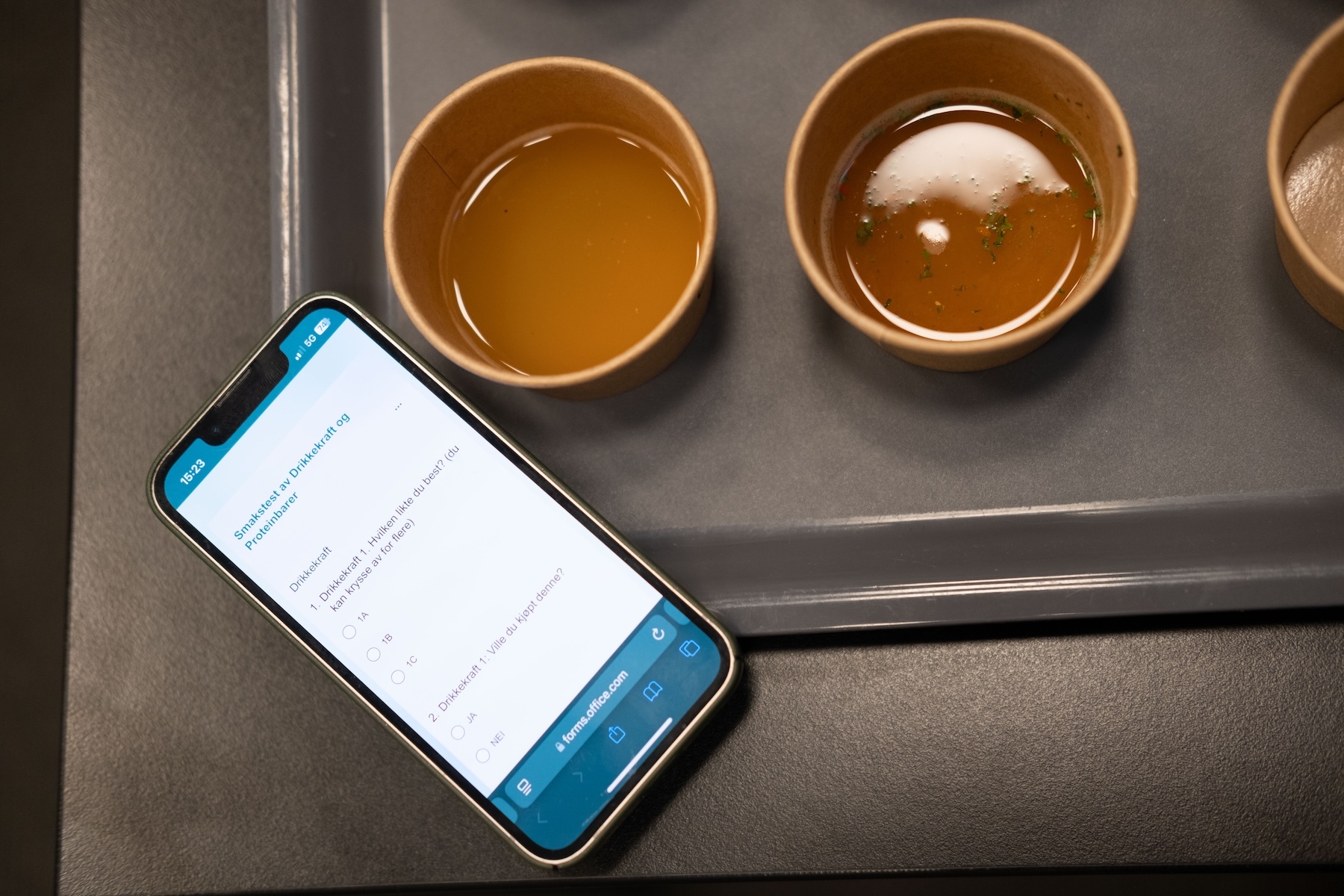The project has generated valuable insights into developing a more neutral-tasting protein hydrolysate derived from chicken and turkey.

The project has generated valuable insights into developing a more neutral-tasting protein hydrolysate derived from chicken and turkey.

During the final meeting, participants were invited to taste various prototypes made with the protein ingredient. The tasting menu included bone broth, protein bars, as well as protein-enriched sausages and meat patties. The samples clearly illustrated the potential of the new protein to enhance both taste and nutritional value.
Norilia and Nortura, in close collaboration with Nofima, SINTEF, and Bioco, have recently completed the HydroSens IPN-project. IPN (Innovation Project for the Industrial Sector) is a support scheme from the Research Council of Norway that promotes research and development in cooperation between companies and research institutions. The aim of the project has been to explore new technologies and methods for developing protein hydrolysates from chicken and turkey with a more neutral taste.
Three years of research and development have produced promising and practical outcomes. These open up new possibilities for using the protein in various food products.
– The protein hydrolysate we have worked with in HydroSens still isn't completely neutral in flavor. But the flavor has significantly improved, says Marianne Skov, project manager and Head of Health and Nutrition at Norilia.
– The project has given us new knowledge about the factors that influence taste. In addition, we have gained practical experience with different technologies to make the hydrolysate taste milder. This increases the potential for the ingredient to be used in a wider range of food applications, Skov explains.
Utilizing the whole animal has always been a central part of Norilia’s mission. Projects like HydroSens further develop this approach by creating even more value from raw materials that previously had limited use. Bones and skin from chicken and turkey contain valuable nutrients such as proteins, vitamins, and minerals. Still, these resources have mostly been used for animal feed – giving them limited commercial value. Through modern and gentle processing, they can now be converted into healthy and functional ingredients, contributing to better resource utilization and more sustainable food production.
At Bioco (owned by Nortura and Felleskjøpet Agri), meat-rich chicken and turkey bones and skin are refined into healthy and sustainable protein ingredients. The raw material is gently processed using a natural enzymatic process – essentially the same way the body breaks down food. The result is a so-called protein hydrolysate: a protein broken down into smaller peptides, making it easy for the body to absorb. This protein ingredient is of high quality and offers broad application potential.
– We have a unique protein with high quality and a natural content of B vitamins and collagen peptides. This makes it especially attractive as a protein enhancer in foods focused on health and nutrition, says Skov.
The protein has previously had a noticeable chicken flavor and a certain bitterness. This made it most suitable for products with salty or umami flavors, limiting its application. The goal of HydroSens has been to examine technologies that can make the flavor more neutral. By testing methods like membrane filtration and microencapsulation, researchers have aimed to reduce the distinctive flavor. This allows for higher inclusion levels in a wider variety of food products – including those with neutral or even sweet flavor profiles.
The project’s final meeting was held on April 1st in Oslo. First on the program was Johan Swahn from The Taste Lab, who shared insights on how sensory research can improve flavor in new food products. He also discussed how we interpret taste through multiple senses. Researchers from Nofima and SINTEF then presented the project’s main findings. Nofima showed how membrane filtration can improve both flavor and functionality of the hydrolysate. SINTEF shared findings from trials with microencapsulation to reduce unwanted flavors. Nofima also presented results from sensory tests. All hydrolysates were evaluated by their sensory panel, providing important insight into how different technologies affected taste and aroma.
– Membrane filtration proved to be a very useful tool for improving flavor quality. It gives us better control over the final product’s properties and can make protein hydrolysates much more usable in the food industry, says researcher Tone Aspevik from Nofima.
The project also included economic analyses of the most promising approaches and investments, providing a solid basis for future industrial decisions.
Throughout the project, consumer studies were conducted and several product concepts were developed. These provided valuable insight into how the protein can be used in finished products for health-conscious consumers, while also opening doors to broader market applications.
During the final meeting, participants were invited to taste various prototypes made with the protein ingredient. The tasting menu included bone broth, protein bars, as well as protein-enriched sausages and meat patties. The samples clearly illustrated the potential of the new protein to enhance both taste and nutritional value.
In HydroSens, research, production, and market perspectives have been closely aligned to achieve results that are relevant and applicable for the industry. The knowledge generated in the project provides a solid foundation for further development and commercialization of a more neutral-tasting protein ingredient.
Norilia and Nortura are now actively working to develop healthy and nutritious consumer products with this protein as a key ingredient.
– Norilia has, together with Felleskjøpet, established Bioco precisely to create new value chains based on the whole animal. This improves resource utilization and increases value creation—while also giving Nortura access to unique ingredients with great potential. We definitely envision this ingredient becoming part of future Nortura product concepts, says Per Berg, Research Director at Nortura.
Nortura and Norilia extend a big thank you to all project partners – Nofima, SINTEF, and Bioco – for a focused and constructive collaboration, and to the Research Council of Norway for funding.